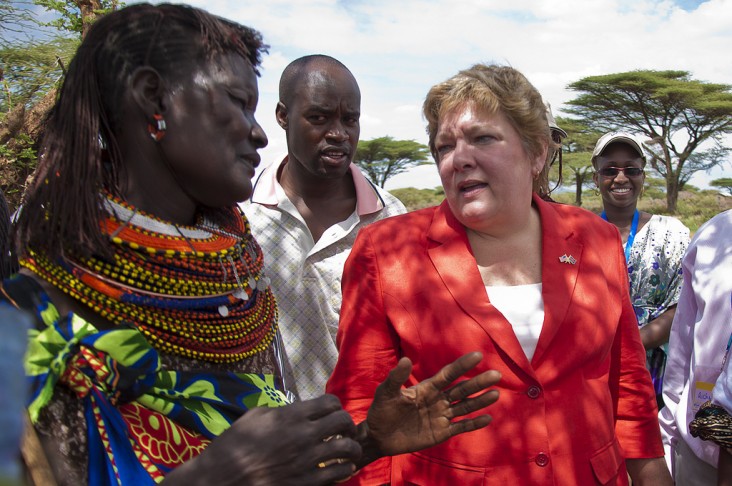
Isiolo, Garissa, Marsabit, Turkana, and Wajir Counties to benefit from greater economic opportunity, improved livestock management, and new water and sanitation facilities at health facilities, nutrition centers, and at home.
For Immediate Release
November 15 -- U.S. Agency for International Development Mission Director for Kenya, Karen Freeman, visited Sidai Africa, Ltd. Super Service Center, a state of the art animal health products and services in Isiolo County to launch three activities that are helping communities and local governments in the arid lands improve health, nutrition, water and sanitation, and livelihoods. The activities will help build resilience in the face of climate change and other potential shocks. She was joined by the Honorable Godana Doyo, Governor of Isiolo County; the Honorable Nadhif Jama Adam, Governor of Garissa County; the Honorable Ukur Kanacho Yatani, Governor of Marsabit County; the Honorable Josephat Koli Nanok, Governor of Turkana County; and the Honorable Ahmed Abdullahi Mohamad, Governor of Wajir County.
The Resilience and Economic Growth in Arid Lands and The Kenya Arid Lands Disaster Risk Reduction Water, Sanitation and Hygiene activities are part of a larger effort by the U.S. Government to assist the Government of Kenya to ensure that people living in Kenya’s arid lands plan for, adapt to, and increase their ability to recover from shocks and stresses, such as drought or flood.
“The partnership we are starting today will help Kenya’s arid lands achieve sustainable economic growth for decades to come. I am proud the United States and Kenya are strong development partners in many areas all over this great country. We have been partners for 50 years and have much more to do together. The Resilience Program we launch today will improve the lives and livelihoods of the communities in this area and make Northern Kenya a better place to raise families,” said Ms. Freeman.
The Resilience and Economic Growth in Arid Lands activities will focus on strengthening and diversifying livelihoods; strengthening the livestock value chain; improving management and productivity of natural resources; conflict management; improving drought management; and increasing consumption of nutritious foods. The Kenya Arid Lands Disaster Risk Reduction Water, Sanitation and Hygiene activity is a partnership between The U.S. Agency for International Development (USAID) and The Millennium Water Alliance, and their four partners– CARE International, Catholic Relief Services, Food for the Hungry, and World Vision. The activity will implement more than 250 infrastructure projects to improve sanitation and hygiene in homes, health facilities and nutrition centers. Access to clean water, improved sanitation, and good hygiene practices make people less vulnerable to malnutrition, even when an environmental or other shock causes food to be scarce.
The Kenya Mission has invested more than $70 million in efforts to strengthen the resilience of communities that suffer repeated environmental shocks, improve water and sanitation, and help Kenya deal with a changing climate.
Related Press Releases
- USAID and IREN announce winners of East Africa Postharvest Technologies Competition 2017
- Power Africa Launches New Partnership with the Nile Basin Initiative and the Nile Equatorial Lakes Subsidiary Action Program
- USAID and COMESA Sign $77 Million Partnership Agreement to Strengthen Regional Development







Comment
Make a general inquiry or suggest an improvement.